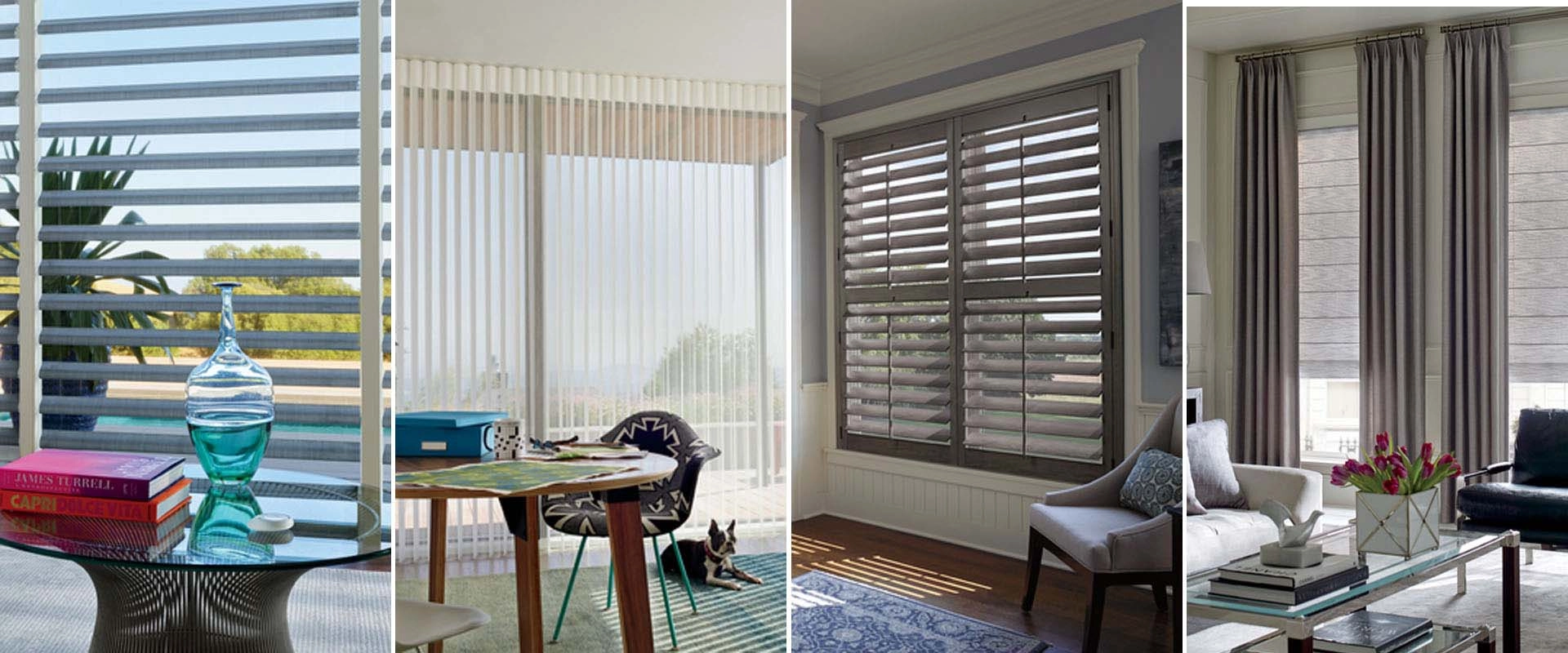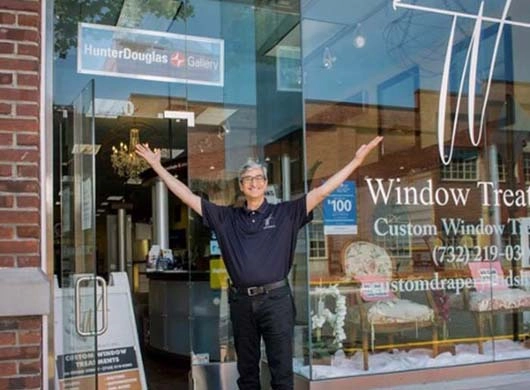Visit Us for Custom Drapery, Window Shades, Shutters & Motorization
REQUEST A WINDOW COVERING CONSULTATION TODAY!
Serving New York, New Jersey & Florida
FAQs About Window Treatments

FREQUENTLY ASKED QUESTIONS ABOUT BUYING WINDOW TREATMENTS
Today, you have more choices than ever when shopping for new window treatments. We have compiled a list of our most frequently asked questions and answers to assist you in the buying process.
HOW DO I CHOOSE THE RIGHT WINDOW TREATMENT?
- Think about why you want to cover your window. What are your primary concerns – privacy, insulation, energy savings, security, style, light control, or to protect your furnishings? This is the first question to answer when trying to find the perfect window covering.
- Let your designer or window treatment consultant know your budget. This will help in narrowing down the product categories and make sure that you will get a solution you love within your budget.
- Design! Think about the emotion you want to create for yourself and others who enter the room in question as well as your home. Now is your chance to create the ambiance and feel that you've always wanted. It’s amazing how the color, style, and options for your window treatments can affect the mood and feel of the room.
WHAT IS THE DIFFERENCE BETWEEN SHADES, BLINDS, AND SHUTTERS?
This category is known as hard treatments as opposed to drapery, which is called soft treatments. Over the years there has been tremendous innovation, and each one of these window treatment categories has expanded to include multiple subcategories. To learn more about specific products see our specific product pages.
- Shades
Shades are a piece of fabric which rolls, stacks or folds, opening to a view only when the shade is rolled up. Certain shades do allow for “view through.” The Hunter Douglas Pirouette is one such product – visit our showroom to see this and other Hunter Douglas products. Types of shades include Roller Shades, Woven Shades, Cellular Shades, Pleated Shades, Solar Shades, and Roman Shades.
Blinds have louvers which allow you view outside without lifting the treatment. It allows you to manipulate light and create a customized feel. The name blinds originated when they were used to "blind” one from seeing into a home. Over the past few years, many new options and designs have developed, including anti-dust features and fabric tapes for blinds. Types of blinds include Wooden Blinds, Faux Wood Blinds, and Aluminum Blinds.
- Shutters
Shutters are usually installed into a window frame and are horizontal slats, either made of wood or a polyresin that can be stationary or tilted. They do not move up and down like blinds, but applications can fold across the window. Types of shutters include Wood Shutters and Polyresin Shutters.
WHAT DO I DO IF MY BLINDS, SHADES, OR DRAPERY BREAK, GET STAINED, OR JUST NEED A TUNE-UP?
Give us a call at 732-219-0303 or send us an email to we can discuss the best possible solution.
DO YOU HANDLE COMMERCIAL JOBS?
Yes. Our staff is equipped, trained, and certified to handle commercial jobs. Projects we have worked on include office buildings, doctor’s offices, conference rooms, and even warehouses.
CAN SOMEONE COME TO MY HOME?
Yes. We work with multiple designers who are more than happy to come to your home for a free, in-home consultation. There is no extra percentage or retainer for using our designers.
FROM WHAT TYPES OF FABRICS CAN I CHOOSE?
Types of fabrics depend on the product you want. If you pick a hard treatment, your options are limited to the colors and options set by the fabricator. When compared to soft treatments like drapery where the fabric options are endless, you can create a truly customized look and feel.
HOW CAN I PROTECT MY DRAPERY FROM THE SUN?
Window film and a good lining are your best bet in protecting your drapery from damaging UV rays. The sun is a constant enemy of any fabric, and any continuous exposure will weaken the strength of most fibers.
WHY ARE ENERGY-EFFICIENT WINDOW TREATMENTS IMPORTANT?
Energy-efficient window treatments save money and translate into year-round savings on the cost of heating and cooling the rooms in which they are installed. The more heat loss and heat gain they prevent, the more money will be saved in keeping those rooms warm in the winter and cool in the summer.
Simple numeric values attributed to product and fabric types will help you gauge the energy efficiency of any Hunter Douglas window treatment.
- WINTER COMFORT - R-VALUES: “R-values,” is a measurement of its ability to resist heat loss. For example, a single layer of uncovered window glass has an R-value of about 1.75. Higher R-values mean better insulation, so by selecting an energy-efficient window covering, those R-values can be increased by 1 to 5 points, resulting in substantial and continuous savings in energy costs. The higher a product's value, the more effective it is in resisting heat loss.
- SUMMER COMFORT - SHADING COEFFICIENTS: A product's "Summer Shading Coefficient" is a measurement of its ability to shade against heat gain. For example, if a window treatment reduces heat by 80% to 95%, this translates into a summer shading coefficient of .20 to .05.
The lower a product's coefficient, the more effective it is in shading against heat gain and reflecting heat. Ultraviolet Protection: Ultraviolet light, entering the home as sunlight, damages furnishings. In time it fades wood floors, furniture, upholstery, draperies, carpeting, and artwork. Prolonged exposure to sunlight causes natural, undyed fabrics to turn yellow, weakening their fibers and making them look old and worn prematurely.
- YOUR BEST DEFENSE - % UV BLOCKAGE: The right window covering can be very effective in blocking ultraviolet rays. Such effectiveness is measured regarding a "% UV blockage" rating. The higher the rating, the greater the UV protection.
Consult the chart, which rates the entire line of Hunter Douglas window coverings as to their effectiveness in blocking ultraviolet light rays through double-glazed windows. To fully minimize the amount of these harmful rays from entering the home, choose a product with a 99% UV blockage rating.
- SOUND ABSORPTION: Sound absorption ratings measure the amount of reflected sound absorbed by the shade or blind. If noise is a concern, choose a blind that soaks up the sound, as indicated by a high sound absorption rating.
How to Choose Child-Safe Window Treatments
Not many are aware, but some window treatments can pose risks for children. Long cords on blinds can cause entanglement or strangulation, which can result in minor to fatal health consequences. Since 1990, 271 child dealths have been linked to window blinds.
Motorized window treatments are the best cordless options. These are operated using a remote control or a mobile app, so children won’t accidentally open or close the blinds themselves.
Wand tilt blinds are another option for cordless window coverings. They aren’t as convenient as motorized coverings, but they’re more affordable, ideal for businesses with limited budgets.
Cordless List System Hunter Douglas now manufactures cordless shades you can simply pull down or push up.
- Move furniture away from your windows, especially if your blinds still have cords, regardless of how short. Kids can stand on the furniture to get hold of the cord.
WHAT ARE THE DIFFERENT TYPES OF STYLES?
- TRADITIONAL
Interiors of the past and popular trends of today blend to create the comfortable and timeless design called Traditional. The aim is not to reproduce looks of the past, but to rethink or reinvent them for the modern home. Rooms are open and airy with large highly curtained windows, stained or faux painted wood, and comfortably upholstered furniture in rich-looking velvet, silk, brocades, and damask fabrics.
- CONTEMPORARY
- Materials are straightforward, and clutter is nowhere to be found in a contemporary home setting. "Metal looks like metal and plastic looks like plastic. There's a restful simplicity found in quiet muted colors, horizontal lines, and low-slung furniture." Some contemporary designers draw on a high-tech look with commercial fixtures, furniture, and blinds.
- FORMAL
One of the most distinguishing features of interior spaces and homes decorated in a formal style is the symmetry of windows, furniture, artwork, and flooring. These elements are most often arranged in exact pairs on a straight axis around the room. Furniture and accessories in formal interiors are often antique. Woods used are generally dark and rich looking colors.
- CASUAL
Casual rooms have simple details, textured elements in fabrics and accessories, restful horizontal lines, soft upholstery, low-luster surfaces, and arrangements that avoid perfect symmetry. Details are simple, and elements are rectangular or softly curved.
- TRANSITIONAL
Transitional design is when you combine two styles into one to create a cohesive look. For example, blending traditional and modern elements. Using a textured fabric on a couch and smooth cottons on an accent chair blends the two styles together. Another example of transitional is combining straight lines with curves.
WHAT DO CUSTOM WINDOW TREATMENTS COST?
Like most custom-made products, it really depends on what you are looking for. Factors that affect price include size, fabric, special features, style, lifting option, hardware, etc. When looking online or in brochures, most prices are based on a 36” x 54” window. For a 36”x54” window, custom hard treatments can cost $100-$700, while drapery is $400+ depending on options such as the fabric, amount of layers, lining, interlining, trims, tassels, hardware, accents, valance or cornice, etc.
WHY SHOULD I GET MOTORIZATION?
- CONVENIENCE: Enjoy life’s daily pleasures instead of using valuable time adjusting your window coverings manually. Enjoy the convenience of getting rid of that annoying glare with just a click of a button, instead of getting up to close the shades during a football game or your favorite movie.
- SECURITY: For home security, programming draperies and shades to open and shut at different times during the day and night also increases safety by creating a ‘lived in’ look even when the homeowner is away on vacation.
- FUNCTIONALITY: Motorization is especially helpful in getting to those ‘hard to reach’ windows in two-story living rooms and dens, above a bathtub, behind furniture, or way up in a skylight.
- CHILD SAFETY: For families with babies and young children, the great advantage is safety from the elimination of the pull cords. With a flip of the switch, the technology allows effortless control.
- ENERGY EFFICIENT: Having the ability to program your window coverings to raise or lower throughout the day will save on your energy bill.
Frequently Asked Questions About Window Coverings IN NEW JERSEY Serving Redbank, Eatontown and Surrounding

WE LOVE WHAT WE DO AND IT SHOWS!
For over 20 years, Window Treats has been your premier source for window coverings and motorization options. Visit our showroom to see full-size displays of Hunter Douglas blinds, shades, and shutters, as well view our custom drapery, valances, cornices and more.
At Window Treats Inc., we aim to ensure you find the perfect window covering for your home. We provide custom-fitted solutions that offer both style and functionality as well as top notch customer service from start to finish.
Window Treats Inc. in Red Bank, New Jersey offers Hunter Douglas window treatments including curtains, blinds, shades, and shutters. These can all be made into motorized blinds, shades, and integrated into a home automation system.
We are in your neighborhood
Window Treats proudly serves the surrounding areas, including Allenhurst, Asbury Park, Colts Neck, Deal, Eatontown, Elberon, Fair Haven, Freehold, Holmdel, Lakewood, Little Silver, Lincroft, Middletown, Monmouth Beach, Oakhurst & Ocean Township, Rumson, Shrewsbury, Spring Lake, Tinton Falls and Toms River.
Our team is often called upon to serve the tri-state area as well including Brooklyn and Manhattan (New York City).
